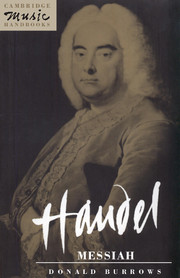Book contents
- Frontmatter
- Contents
- Preface
- References to ‘Messiah’ editions
- 1 The historical background
- 2 From composition to first performance
- 3 The first London performances
- 4 Revival and revision, 1743–1759
- 5 Messiah in other hands
- 6 Design
- 7 Individual movements
- 8 Handel's word-setting
- Appendix 1 The libretto of Messiah
- Appendix 2 Messiah sources
- Notes
- Bibliography
- Index
6 - Design
Published online by Cambridge University Press: 05 June 2012
- Frontmatter
- Contents
- Preface
- References to ‘Messiah’ editions
- 1 The historical background
- 2 From composition to first performance
- 3 The first London performances
- 4 Revival and revision, 1743–1759
- 5 Messiah in other hands
- 6 Design
- 7 Individual movements
- 8 Handel's word-setting
- Appendix 1 The libretto of Messiah
- Appendix 2 Messiah sources
- Notes
- Bibliography
- Index
Summary
Messiah within the oratorio genre
Messiah was created within the specific genre of Handel's London theatre oratorios, and against a background of experience built up by both composer and audience prior to 1741. The theatre audience's expectation of a three-section evening's entertainment, lasting about three hours in performance with two intervals, was carried over from the three acts of Italian opera to the three parts of English oratorio. The perceived characteristics of Handel's oratorios were neatly summed up by Newburgh Hamilton in his Preface to the printed libretto for Messiah's ‘twin’ oratorio, Samson:
Mr. Handel happily introduc'd here Oratorios, a musical Drama, whose Subject must be Scriptural, and in which the Solemnity of Church-Musick is agreeably united with the most pleasing Airs of the Stage.
Even so, we may still be slightly surprised by Jennens's description of Messiah as ‘a fine Entertainment’.
Three features set Messiah apart from the main body of Handel's oratorios. The text, adapted from scripture (the Authorised Version of the Bible and the ‘Coverdale’ translation of the psalms associated with the Book of Common Prayer), includes no metrical or rhymed verse, such as was normally characteristic of aria texts for opera and oratorio. While the prose ‘verses’ of the scriptural sources have no metrical structure, they do nevertheless have a controlled rhetorical flow: English translations of the scriptures were, after all, intended as ‘performance texts’, to be read aloud at public worship.
- Type
- Chapter
- Information
- Handel: Messiah , pp. 55 - 67Publisher: Cambridge University PressPrint publication year: 1991



